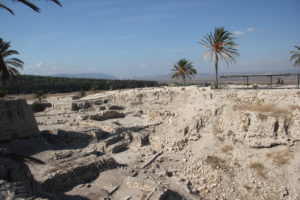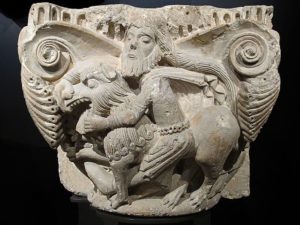In the 12th and 11th centuries BC, there was great instability in the land of Israel. The Israelite tribes fought to conquer and control their own valleys and towns against the powerful inhabitants of the area, while facing sporadic invasions by peoples from faraway lands.
In Canaan, a regime of independent city-states persisted, each with its own king or governor: Shechem, Jebus, Gezer, Megiddo, Taanach, and Beth-shan, among others. Israel, for its part, was a collection of tribes whose common bond was not strictly political but religious: faith in the Lord and the stories passed down through ancestral traditions about their common origin and the marvelous religious experiences they shared with sister tribes, such as the exodus from Egypt and a long pilgrimage through the desert.

Megiddo photo by Omer Markovski
The Book of Judges, although written several centuries after these events, preserves ancient traditions that provide some information about the religious practices of the tribes that settled in Canaan over time.
During that era, the sanctuary at Shiloh, where the Ark of the Covenant was kept, was of notable importance. The Ark accompanied the people in their battles as a sign of divine protection.
The faith in the Lord was still at a very primitive level, lacking the clarity that would later be provided by the development of Revelation through prophetic activity and theological reflection. The common people tended to create cast metal idols and worship them domestically. An illustrative case is the man from the hill country of Ephraim who dedicated eleven hundred shekels of silver to the Lord to make an idol, which he placed in a shrine of his own, and for whose worship he managed to hire a Levite (Judges 17:1-12).
The protagonists of the Book of Judges are charismatic leaders who deliver the people from some imminent danger, but they are not models of ethical behavior. For example, Samson was a capricious and vindictive man who married a Philistine woman, not an Israelite (Judges 14:1-8). Jephthah, for his part, made a reckless vow to offer in sacrifice the first living being he encountered upon returning home if the Lord would favor him in battle, and he fulfilled this vow by sacrificing his own daughter (Judges 11:31-39).
The Book of Judges presents a theological vision of the memories that remained among the tribes about their settlement in the land of Canaan, written in the light of the Covenant theology. By presenting each of the major judges, it develops the traditional elements available, grouping them around a single argumentative scheme: sin, punishment, and salvation.

Samson fighting with the lion, Capital Archaeological Museum (Madrid)
It could be said that the entire book is a call to fidelity. Without it, maintaining the Covenant is not possible, and sin is a serious breach of that fidelity that introduces disorder into the relationship with God. However, in the face of the people’s frailty, God’s patience is highlighted, who repeatedly manifests by his protection, the love he has for his chosen ones.
For the reader, the Book of Judges is a call to self-examination that leads to recognizing one’s own sins and infidelities and to trust in God, who is always faithful and ready to bring salvation when called upon with a sincere heart.
Don Francisco Varo Pineda, priest
